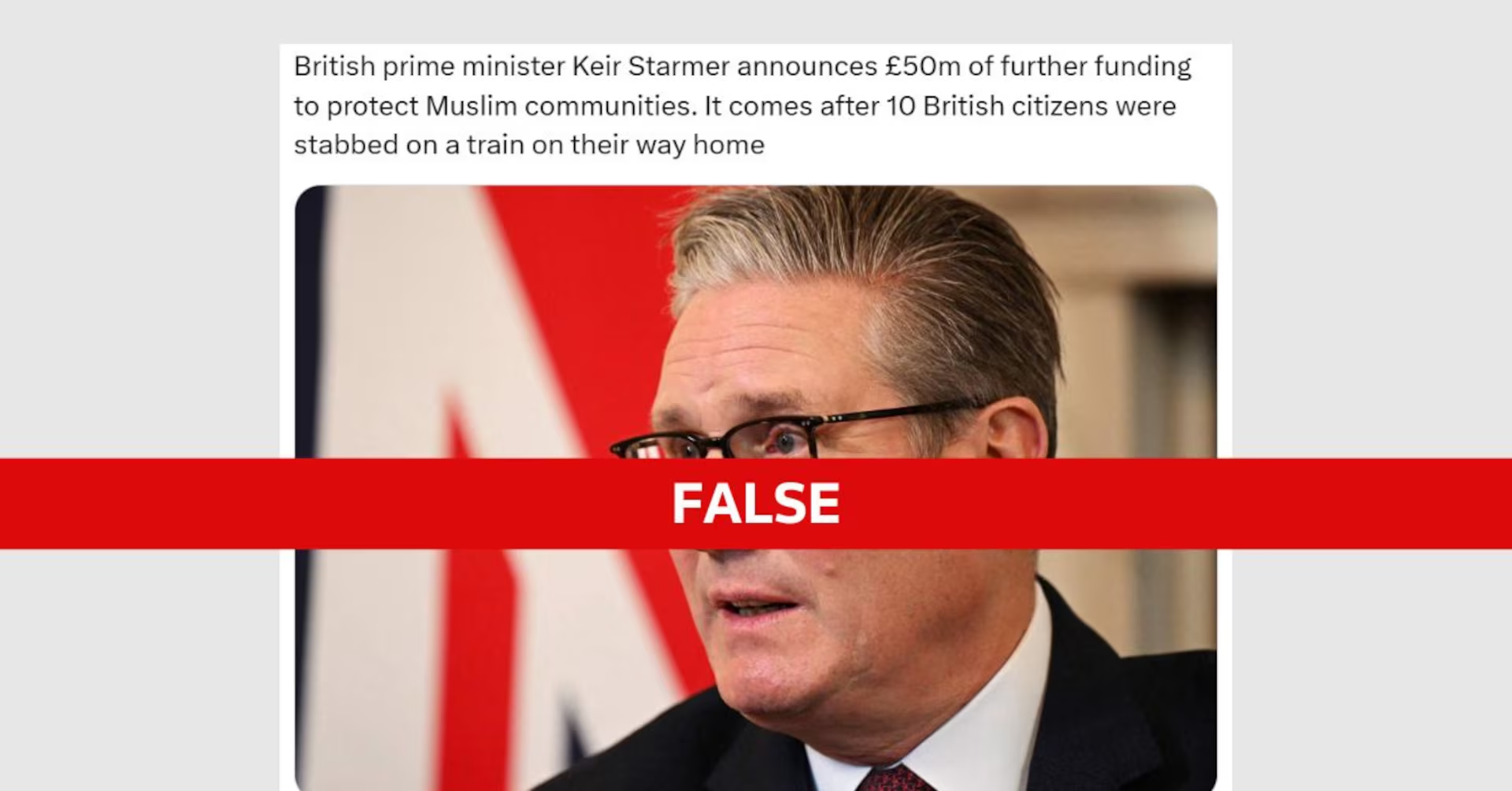Listen to the article
Claims that British Prime Minister Keir Starmer announced £50 million in funding to protect Muslim communities following a recent train stabbing incident have been debunked as false, according to a Reuters fact-check investigation.
The viral claim, which circulated widely on social media platform X, suggested that Starmer had allocated the substantial sum specifically in response to a November 1 knife attack on a London-bound train that left 11 people injured. The post, which garnered approximately 1.5 million views, stated: “British prime minister Keir Starmer announces £50m of further funding to protect Muslim communities. It comes after 10 British citizens were stabbed on a train on their way home.”
However, extensive research by Reuters found no evidence of any such announcement by the Prime Minister or his office in the aftermath of the November 1 attack. When contacted for comment, a Downing Street spokesperson directed Reuters to an earlier funding announcement made on October 23 – more than a week before the train incident occurred.
The actual announcement, made by Starmer’s government in late October, allocated £10 million – not £50 million – for security measures at mosques and Muslim faith centers across the United Kingdom. This funding was part of a broader initiative to address rising hate crimes targeting Muslim communities, which had been a concern prior to the train attack.
According to the government’s official press release from October 23, the £10 million funding package “means more sites can be protected and builds on the £29.4 million already available this year for mosques and Muslim faith schools.” This indicates that while significant funding has been directed toward protecting Muslim institutions, the figures and timing cited in the viral social media claim were inaccurate.
In the immediate aftermath of the November 1 train stabbing, Starmer’s public response was limited to a statement posted on X expressing concern for those affected. “My thoughts are with all those affected, and my thanks go to the emergency services for their response,” the Prime Minister wrote, making no mention of any new security funding.
The misrepresentation of the government’s actions comes amid heightened tensions and concerns about both terrorism and Islamophobia in the United Kingdom. Security funding for religious institutions has become an increasingly important issue in recent years, with various communities seeking protection against potential targeted attacks.
The £10 million announced in October represents a significant investment in community security measures and reflects growing government recognition of the threats faced by religious minorities. The funding is expected to be used for physical security improvements at mosques and Muslim community centers, including enhanced surveillance systems, security personnel, and other protective measures.
The spread of false information regarding government responses to violent incidents highlights the challenge of misinformation in crisis situations. Social media platforms have increasingly become vectors for rapidly disseminated claims that can be difficult to verify in real-time, particularly during emotional moments following violent incidents.
This incident underscores the importance of fact-checking and verification in public discourse, especially concerning sensitive topics like community safety, government spending, and responses to violence. The Reuters fact-check team regularly investigates viral claims to provide accurate information to the public.
The train stabbing incident itself remains under investigation by British authorities, with details about the perpetrator and motives still being determined as of the time of publication.
Fact Checker
Verify the accuracy of this article using The Disinformation Commission analysis and real-time sources.




8 Comments
While the initial £50 million claim may have been well-intentioned, it’s important to verify information before spreading it widely. The fact-checking process here is a good example of how to properly address potential misinformation.
While any funding to enhance security and protect communities is important, it seems the original £50 million claim was inaccurate. The actual £10 million announcement is still a meaningful investment, but the details matter. Glad to see this clarified.
Kudos to the fact-checkers for taking the time to investigate this claim thoroughly. It’s a good lesson on the importance of verifying information, even if the initial claim seemed plausible. Transparency around the actual £10 million funding is important.
Glad to see the facts being checked on this claim. It’s important to verify information, especially around sensitive issues like this, before spreading it widely on social media. Appreciate the Reuters investigation and the clarification from the Prime Minister’s office.
Appreciate the government’s efforts to improve security for Muslim communities, even if the initial social media claims were exaggerated. Fact-checking is vital to ensure the public has accurate information, especially around issues of public safety and community support.
This is a good example of why we need rigorous fact-checking, especially on sensitive topics. Appreciate the Reuters investigation to clarify the details around the government’s actual £10 million funding announcement for mosque security.
This fact check highlights the need for caution when it comes to claims made on social media, even if they seem plausible. Verifying information from credible sources is crucial, especially on sensitive topics. Kudos to Reuters for their thorough investigation.
Interesting that the original claim about £50 million in funding was so widely shared, despite lacking evidence. Shows how misinformation can spread quickly online. Good to see the government’s actual announcement of £10 million for mosque security measures.